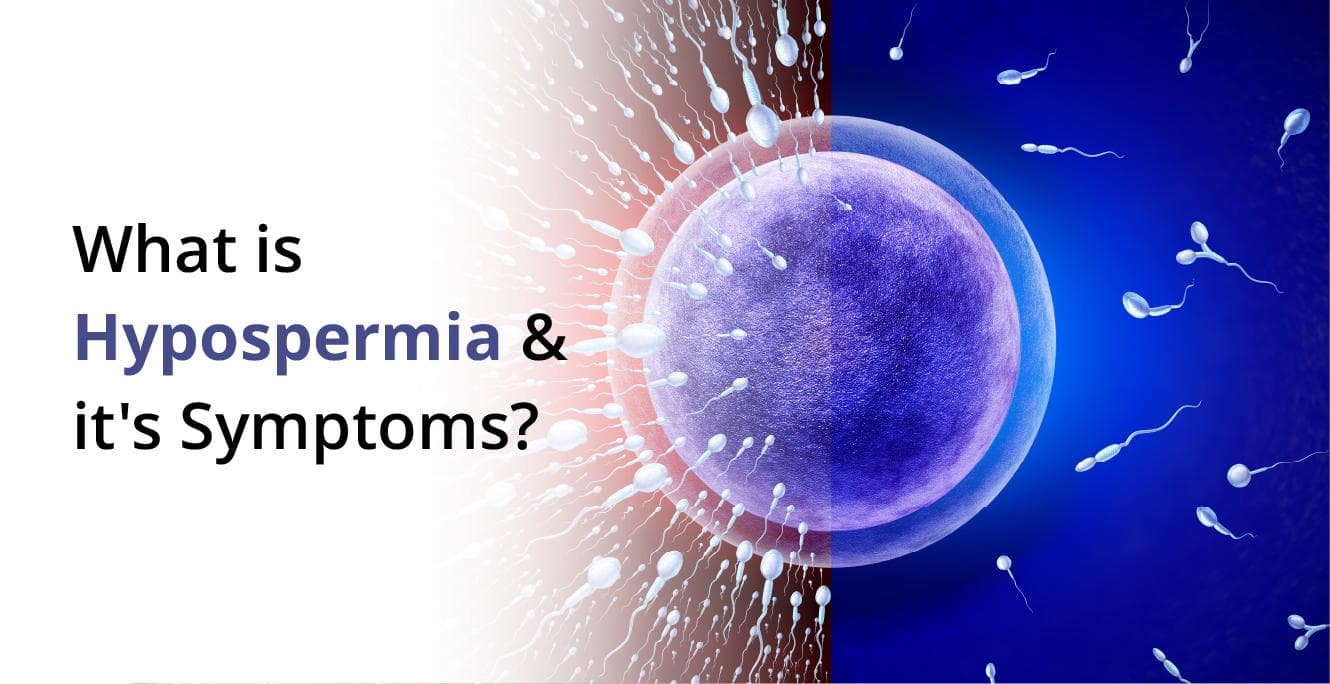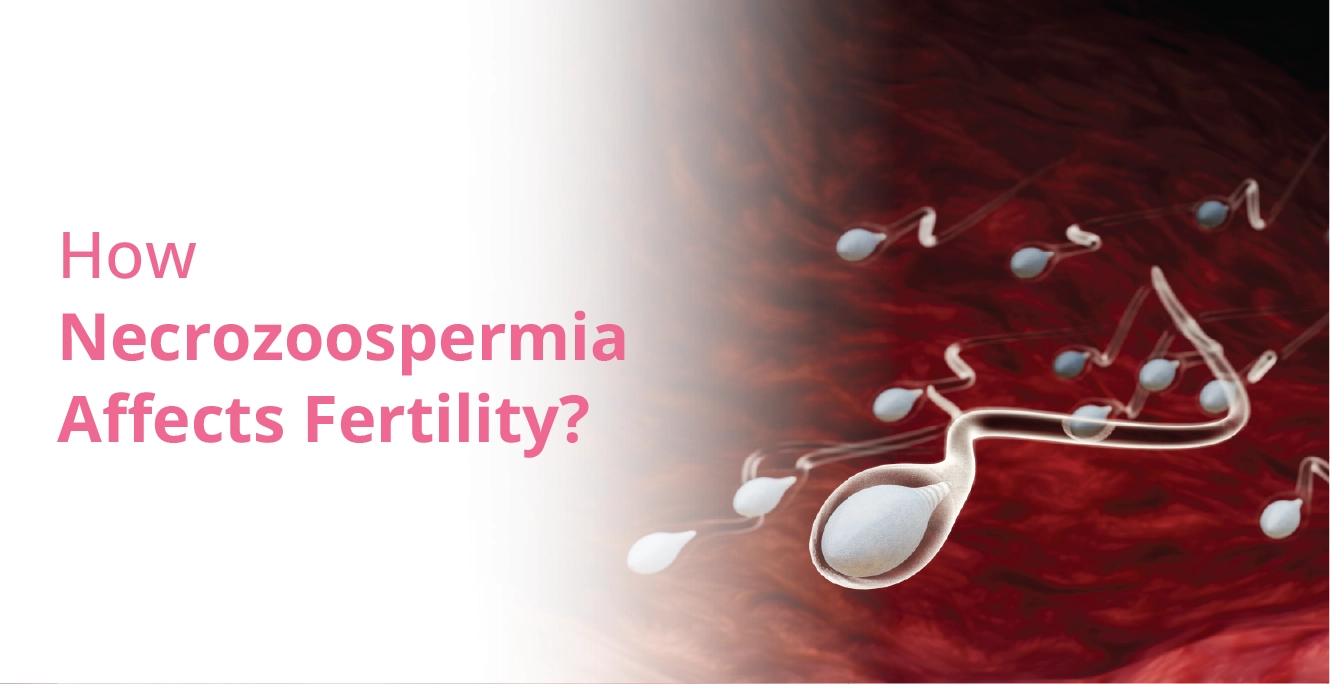
Hypospermia: Causes, Symptoms, and Treatment

Table of Contents
- What is Hypospermia?
- Impact of Hypospermia on Male Fertility
- Different Types of Hypospermia
- Symptoms of Hypospermia:
- Causes of Hypospermia
- Diagnosis of Hypospermia
- Hypospermia Treatment Options
- How to Prevent Hypospermia?
- Conclusion
- Frequently Asked Questions (FAQs)
- Can hypospermia be prevented, and are there lifestyle changes to support reproductive health?
- How does age relate to hypospermia, and does it affect fertility differently in various age groups?
- Are there specific risk factors that increase the likelihood of developing hypospermia?
- Can hypospermia be a sign of an underlying health issue beyond reproductive concerns?
- Can you get pregnant with hypospermia?
- Does frequent ejaculation cause hypospermia?
- Is hypospermia treatable?
Male fertility is not determined by sperm count alone; semen volume also plays a vital role in conception. When ejaculation consistently produces a lower-than-normal amount of semen, it may signal an underlying condition that often goes unnoticed.
With a focus on global prevalence, symptoms, causes, diagnosis, treatment choices, influence on fertility, risk factors, prevention advice, and a final perspective, this blog seeks to offer thorough insights into hypospermia.
What is Hypospermia?
Hypospermia is a condition characterised by reduced semen volume, typically less than 1.5 milliliters per ejaculation. Semen carries, protects, and supports sperm on their journey toward fertilization, so lower volume can affect overall fertility potential. It may result from hormonal imbalances, infections, reproductive tract blockages, certain medications, dehydration, or lifestyle factors. Proper diagnosis through semen analysis and medical assessment helps identify the cause and guide suitable treatment options.
In addition, according to the International Journal of Reproduction, some researchers have reported statistical analysis of one state to give a better understanding of fertility disorders faced by men. Refer to the attached PDF and give it a read to know about the abnormalities found in semen analysis of infertile men on evaluation.
Although accurate worldwide data on hypogonadism are difficult to get because of underreporting, research indicates that a significant proportion of men may be affected. There are regional differences as well, with varying prevalence rates across areas. It is easier to see the scope of the problem and the need to raise awareness when one is aware of the global context.
Impact of Hypospermia on Male Fertility
A man is not always sterile just because his semen volume has decreased. It might, however, make it more difficult for sperm to get through the female reproductive system.
This decrease can further reduce the likelihood of a natural pregnancy if it is coupled with other conditions, such as low sperm concentration. Because of this, hypospermia should be regarded as a warning sign that calls for a thorough reproductive assessment.
Hypospermia can sometimes indicate underlying hormonal imbalances, infection, or partial blockages in the reproductive tract. Certain lifestyle factors, such as dehydration, smoking, excessive alcohol intake, or frequent ejaculation, may also contribute to reduced semen volume.
Different Types of Hypospermia
Hypospermia comes in a variety of forms, including acquired and congenital. While acquired hypospermia develops later in life due to various factors, such as trauma, infection, or hormonal imbalances, congenital hypospermia is present from birth. Hypospermia can also develop as a result of other conditions, such as excessive alcohol use. Hypospermia can result from anomalies in the seminal vesicles and vas deferens, which are essential for the production of semen. Hypospermia can also result from a variety of illnesses that impact the male reproductive system, such as cancer. Effective diagnosis and treatment of hypospermia depend on an understanding of its various forms and causes.
Symptoms of Hypospermia:
The disorder known as hypospermia is typified by a lower-than-normal volume of semen produced after ejaculation. Although decreased semen volume is the main symptom, other features and subtle clues may be noticed. Here is a thorough examination of hypospermia symptoms:
- Reduced Semen: A notably lower volume of semen during ejaculation is the primary sign of hypospermia. Although it varies from person to person, this reduction is often less than the volume average.
- Variations in Semen Consistency: People who have hypospermia may observe changes in their semen’s consistency. This might involve variations in viscosity or thickness.
- Having Trouble Getting Pregnant: Although hypospermia is not a direct cause of infertility, it might make it more difficult to get pregnant. The likelihood of fertilisation may be affected by reduced semen volume, which could influence sperm survival and motility.
- Modifications to Ejaculatory Sensation: A few people with hypospermia may have modifications to their ejaculatory sensations. This could be anything from a distinct emotion at the peak to the impression of an incomplete or modified release.
- Discoloration of Semen: The semen’s color may vary under specific circumstances. Although semen is normally whitish-grey, color differences may indicate an underlying problem causing hypospermia.
- Pain and Discomfort: Hypospermia may be linked to pain during ejaculation, particularly if the illness is brought on by infections or inflammatory disorders that impact the reproductive system.
- Underlying Causes Showing Symptoms: People may also have symptoms associated with the underlying cause since hypospermia can be a secondary sign of various illnesses. For instance, vaginal pain, swelling, or discomfort may be the initial sign of an infection.
It’s important to remember that hypospermia symptoms might be mild, and people may not necessarily associate them with a particular reproductive health problem. Seeking medical guidance and undertaking a thorough evaluation, including semen analysis, is essential for an accurate diagnosis and suitable care if someone observes persistent changes in semen volume or related symptoms. Improving reproductive health and addressing underlying issues are more likely when early detection and intervention are carried out.
Causes of Hypospermia
There are a number of causes of hypospermia, including:
- Obstruction: Reproductive tract blockages may prevent semen from releasing.
- Hormonal Imbalances: Low semen production may be caused by abnormalities in the levels of certain hormones, especially testosterone.
- Underlying illnesses: Several conditions, including epididymitis and prostatitis, can affect semen volume.
- Medication: Hypospermia is a possible adverse effect of several drugs, such as those used to treat hypertension.
Diagnosis of Hypospermia
A thorough assessment that includes physical exams, testing, and assessments of medical history is necessary to diagnose hypospermia. The following summarises the common diagnosis and evaluation procedures for hypospermia:
- Medical History: The healthcare professional will inquire about the patient’s past health, encompassing any issues related to reproduction, infections, surgeries, drugs, and lifestyle choices.
- Physical Examination: To detect any anomalies, such as swelling, soreness, or structural problems, a comprehensive physical examination may be carried out, including a genital examination.
- Semen Analysis: One important diagnostic test for hypospermia is semen analysis. This test evaluates the volume, motility, morphology, and sperm count in the semen, among other factors. One of the main signs of hypospermia is a lower-than-normal semen volume.
- Blood Tests: Testosterone levels can be measured by blood testing. Hypospermia can be caused by hormonal imbalances, and these tests assist in finding any abnormalities.
- Ultrasound Imaging: The testicles and prostate, among other reproductive organs, can be imaged using ultrasound to reveal their structure and detect potential anomalies that may be causing diminished semen volume.
- Urinalysis Following Ejaculation: This procedure can be used to detect retrograde ejaculation, which is the passage of semen into the bladder, which can result in a reduction in the volume of semen.
- STI Testing: Since some infections can affect reproductive health and lead to hypospermia, testing for sexually transmitted infections (STIs) may be necessary.
- Genetic Testing (if indicated): To determine whether there are any underlying genetic factors that may be associated with reproductive problems, genetic testing may be advised in some circumstances.
- Prostate-specific Antigen (PSA) Test: Because disorders affecting the prostate can alter semen volume, an assessment of prostate health in older adults may involve a PSA test.
- Scrotal Doppler Ultrasound (if indicated): To assess blood flow to the testicles in the event that vascular problems are suspected, a scrotal Doppler ultrasound may be conducted.
Hypospermia Treatment Options
Following a diagnosis, the patient and the healthcare team can work together to determine the underlying cause of the hypospermia and develop a customised treatment plan. Depending on the underlying cause, treatment differs:
- Medication: Hormonal therapy can treat imbalances, and antibiotics may be administered for infections.
- Surgical Interventions: To clear blockages or address anatomical problems, surgery may be required.
- Lifestyle Modifications: Developing a healthy lifestyle that includes regular exercise and a balanced diet can positively affect semen production.
How to Prevent Hypospermia?
Certain lifestyle and health practices can help lower the risk of hypospermia, even though not all of its causes can be avoided:
- Drink enough water to maintain healthy semen production and reproductive function.
- To promote the health of your sperm and semen, eat a balanced diet that includes foods high in antioxidants, zinc, selenium, vitamin C, and vitamin D.
- Limit alcohol intake and abstain from smoking. Both these substances can have a detrimental impact on sperm quality and semen volume.
- Stress can throw off your hormone balance, which can affect how much semen you produce.
- Healthy testosterone levels and reproductive health are supported by moderate physical activity.
- Avoid tight clothing, saunas, and extended hot baths since they can interfere with sperm production.
- Complications can be avoided by treating urinary or reproductive system infections early.
- Early detection of hormonal or structural problems is facilitated by routine medical assessments.
Conclusion
Hypospermia is a disorder that should be taken seriously, particularly by those who intend to become parents. Results can be greatly enhanced by receiving a diagnosis as soon as possible, understanding the underlying causes, and investigating appropriate treatment options. By raising awareness and promoting candid conversations regarding male reproductive health, we can help treat hypospermia and related fertility issues in a proactive manner. If you are diagnosed with hypospermia and you are trying to start a family, consult our fertility expert today. You can either call us directly by dialling the number above, or book an appointment by filling in the appointment form. Our coordinator will call you back shortly to understand your query and will connect you with the best fertility expert at Birla Fertility & IVF.
Frequently Asked Questions (FAQs)
Can hypospermia be prevented, and are there lifestyle changes to support reproductive health?
Reproductive health can be positively impacted by leading a healthy lifestyle that includes regular exercise, a balanced diet, and abstaining from excessive alcohol and tobacco use, even if some causes may not be preventable.
How does age relate to hypospermia, and does it affect fertility differently in various age groups?
Fertility and semen volume can be affected by age. Hormonal changes that affect semen output may be associated with older age. Anyone who plans to start a family must understand these age-related factors.
Are there specific risk factors that increase the likelihood of developing hypospermia?
Indeed, there are a number of variables that can raise the risk of hypospermia, including infections, hormone abnormalities, and some drugs. People can take proactive measures to maintain their reproductive health by being aware of these risk factors.
Can hypospermia be a sign of an underlying health issue beyond reproductive concerns?
Indeed, hypospermia may occasionally be a sign of more serious health problems. If hypospermia is detected, it is critical to consider potential additional health effects and consult a medical specialist for a thorough assessment.
Can you get pregnant with hypospermia?
Yes, pregnancy is still possible with hypospermia, especially if sperm count and motility are normal. However, reduced semen volume may lower natural conception chances, so a proper fertility evaluation is recommended.
Does frequent ejaculation cause hypospermia?
Frequent ejaculation can temporarily reduce semen volume because the body may not have enough time to fully replenish seminal fluid. However, this effect is usually short-term and does not typically cause permanent hypospermia.
Is hypospermia treatable?
Yes, hypospermia is often treatable, especially when the underlying cause, such as hormonal imbalance, infection, dehydration, or blockage, is identified. With proper medical evaluation and targeted treatment, semen volume and fertility outcomes can improve significantly.
Our Fertility Specialists
Related Blogs
To know more
Birla Fertility & IVF aims at transforming the future of fertility globally, through outstanding clinical outcomes, research, innovation and compassionate care.
Had an IVF Failure?
Talk to our fertility experts

 Our Centers
Our Centers















